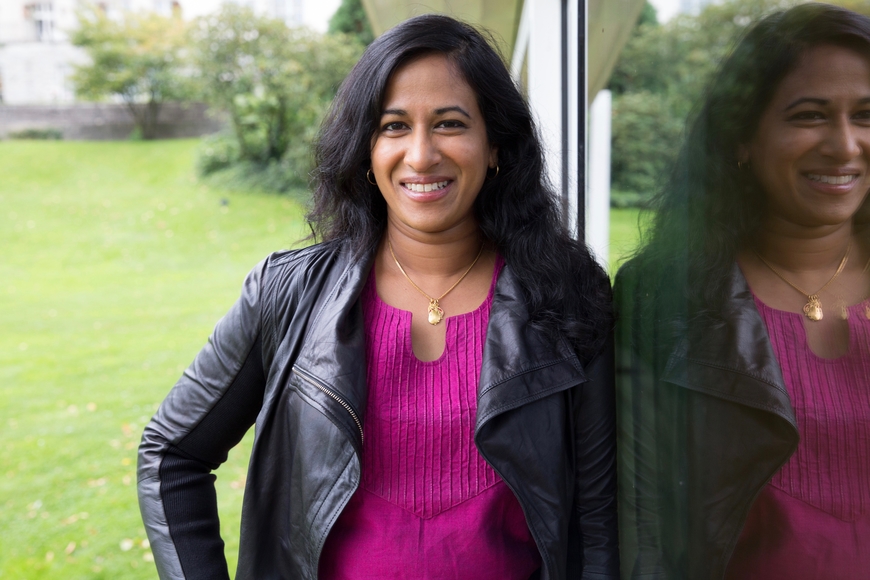Human Rights Initiative Spotlight: Using storytelling to capture nuances of the Sri Lankan civil war
My first question posed to Professor V. V. “Sugi” Ganeshananthan was an impossible one.
“Can you briefly sum up the Sri Lankan civil war for me?”
A 2017 Human Rights Initiative grantee and faculty member in the Department of English, Professor Ganeshananthan began to explain the thirty-year conflict — from 1983 to 2009 — between Sri Lankan government security forces and the Tamil militants, specifically the Liberation Tigers of Tamil Eelam (LTTE).
“I often get asked, ‘Who is the bad guy?’” Professor Ganeshananthan said. “To which I think there is no real answer.”
She stressed the importance of understanding the conflict as more than the convergence of two hostile, combative forces. One must consider the involvement of the international community, various Sri Lankan diasporas — the Tamil diaspora, the Sinhalese diaspora — and the conflict’s effect on civilians, particularly women and children.
With the help of a 2017 Human Rights Initiative grant, Professor Ganeshananthan is using fiction as a platform to dissect the conflict and its many far-reaching implications.
But why fiction and not a more traditional academic approach?
“I wouldn’t underestimate the power of academia or presume to know its limits … but I grew up reading fiction,” she said.
“Storytelling, whether it is fiction or nonfiction, has the ability to capture nuance; academia is often—not always, but often—seeking to answer questions or present arguments, whereas I think fiction is capable of simply posing a series of questions without the requirement that one should answer them or know everything.”
Professor Ganeshananthan is not new to storytelling. Her 2008 novel, Love Marriage, won numerous accolades; it told the story of a young woman born to Sri Lankan parents in America and her family’s reunion with an uncle who fought with the Tamil Tigers.
Professor Ganeshananthan is using her award to have Love Marriage translated into Sri Lanka’s national languages, Sinhalese and Tamil. Language politics and parity are an ongoing controversy in Sri Lanka, where the constitution recognizes Sinhalese and Tamil as official languages, and English as a link language. While government services are supposed to be available in all three languages, on the ground that is often far from the case.
At one point, English was spoken more widely, but as the war progressed English education in many places was decimated. “For example, many of my older relatives speak English fluently and some of my younger relatives don’t,” Professor Ganeshananthan told me.
Translation can be a difficult task. “Indian Tamil is different than Sri Lankan Tamil, and then diaspora Tamil is often bastardized in certain ways, and the book represents that in particular ways in English that are difficult to translate.”
Professor Ganeshananthan’s other projects include a new novel, Movement, which takes place in Sri Lanka in the late 1980s and is concerned with political theatre coming from various parties to the conflict. Movement is very much about narratives and what principled resistance looks like.
Professor Ganeshananthan is also working on a collection of personal and political essays and selected poetry. She has written numerous pieces over the years that defy conventional genres. “Some of them are short stories, some of them are essays, one of them is a set of tongue twisters…”
I asked Professor Ganeshananthan if writing novels gets easier as practice and experience accrue.
“Every novel is different,” she said. “Each one has to find its form.”
“I think one helpful thing about a novel is that I don’t ever hear people say ‘Oh, that novel is perfect.’ People don’t say that. So, if you just remove the idea that it has to be — it just doesn’t have to be.”



